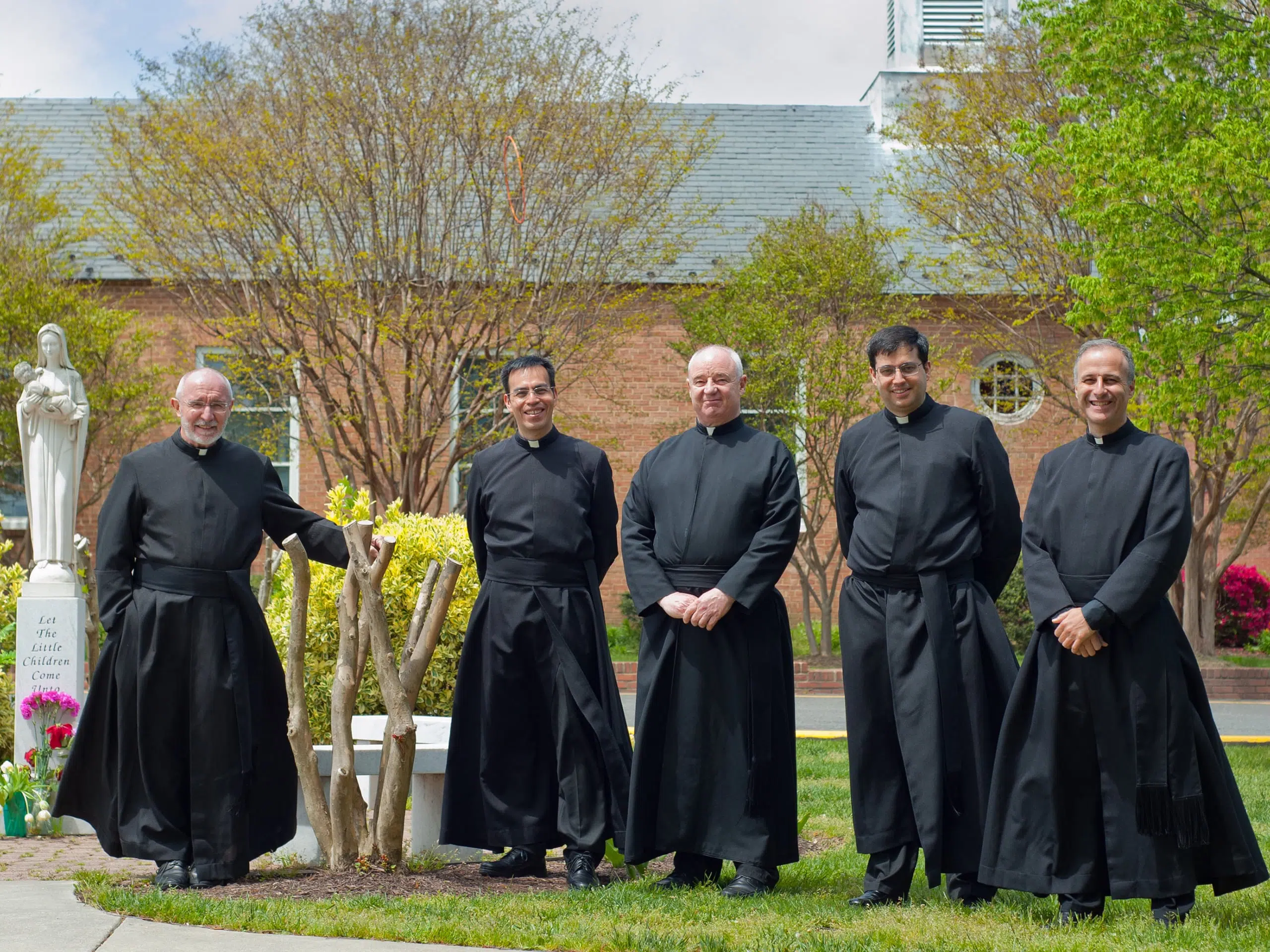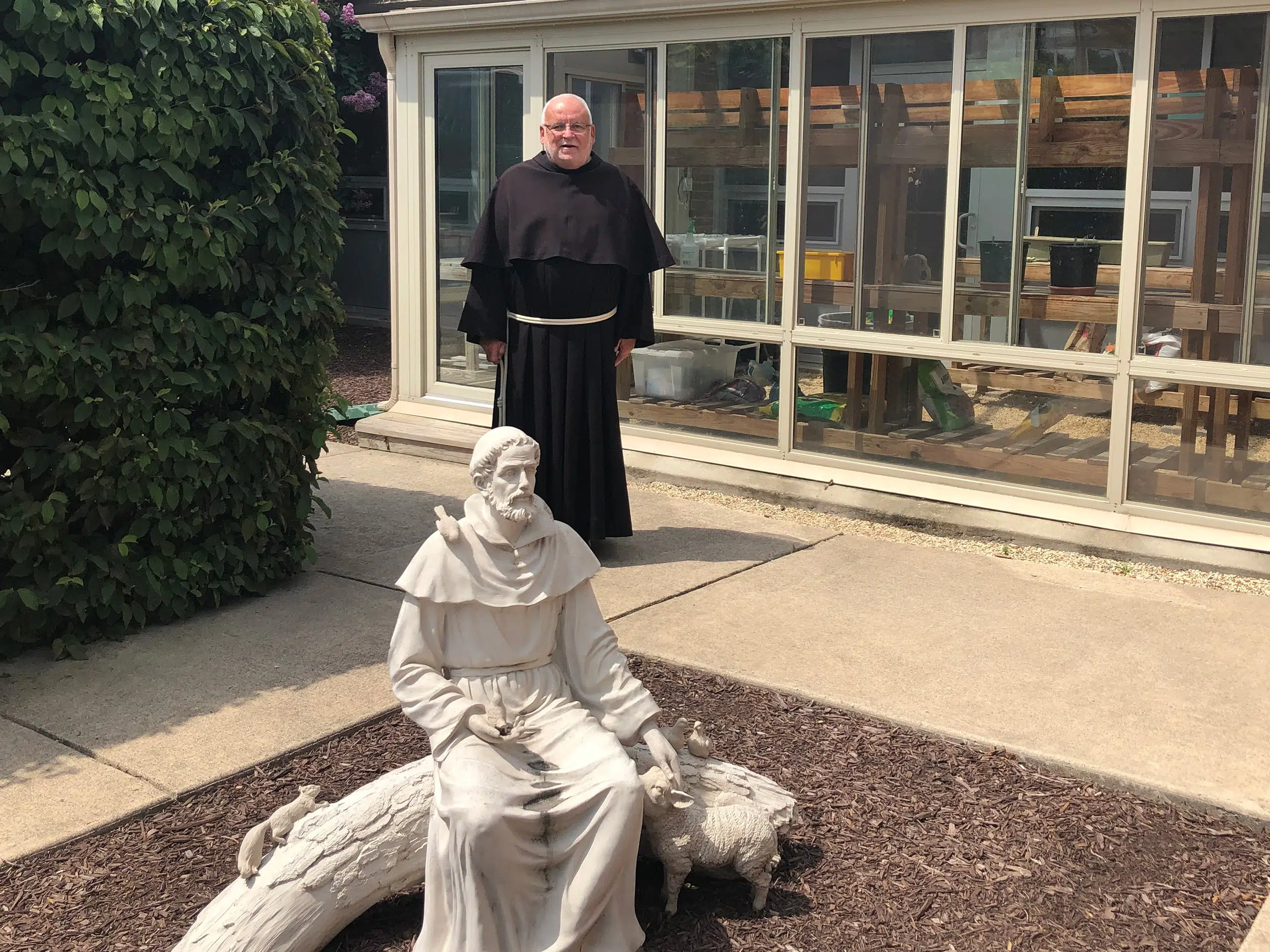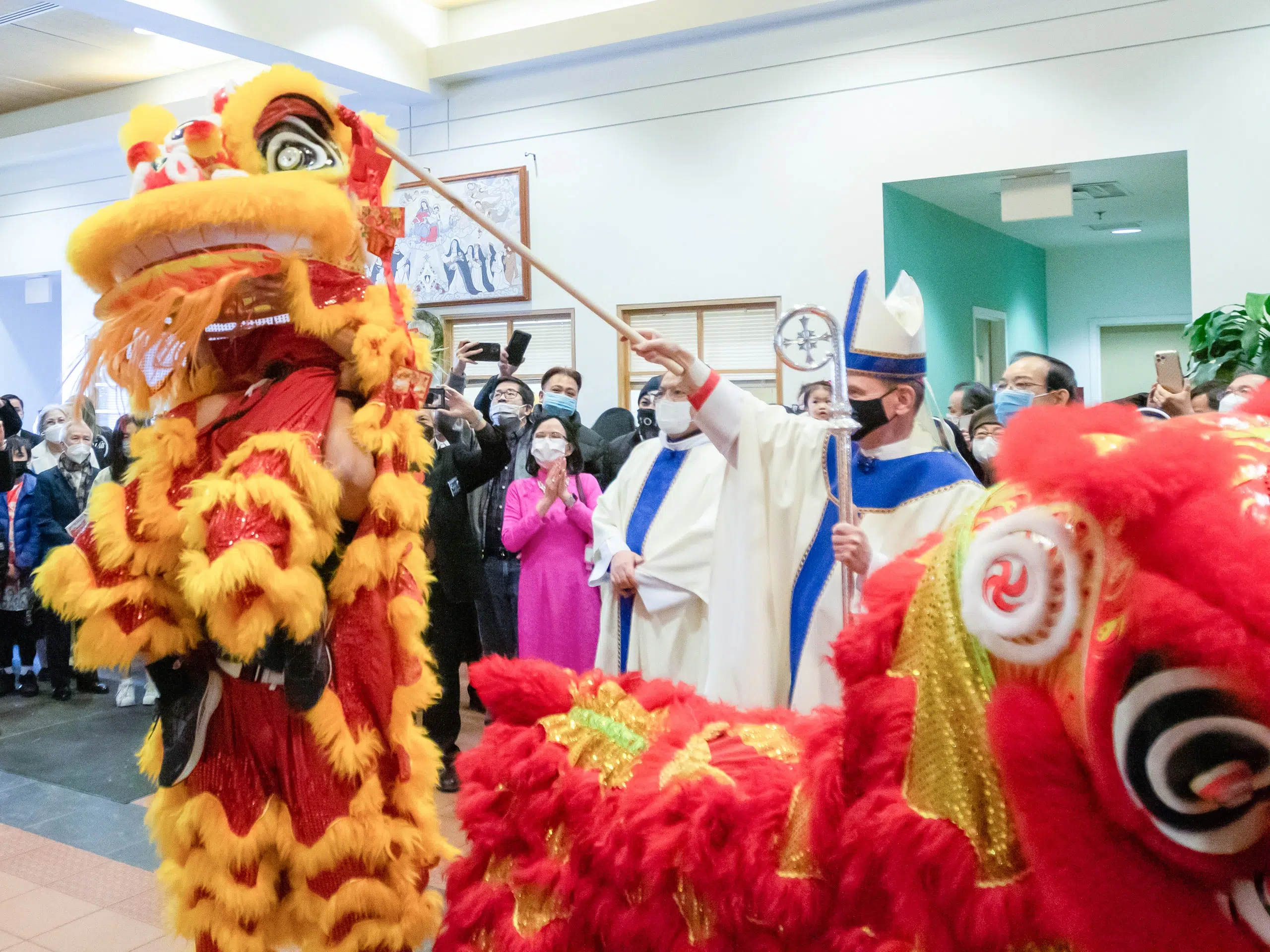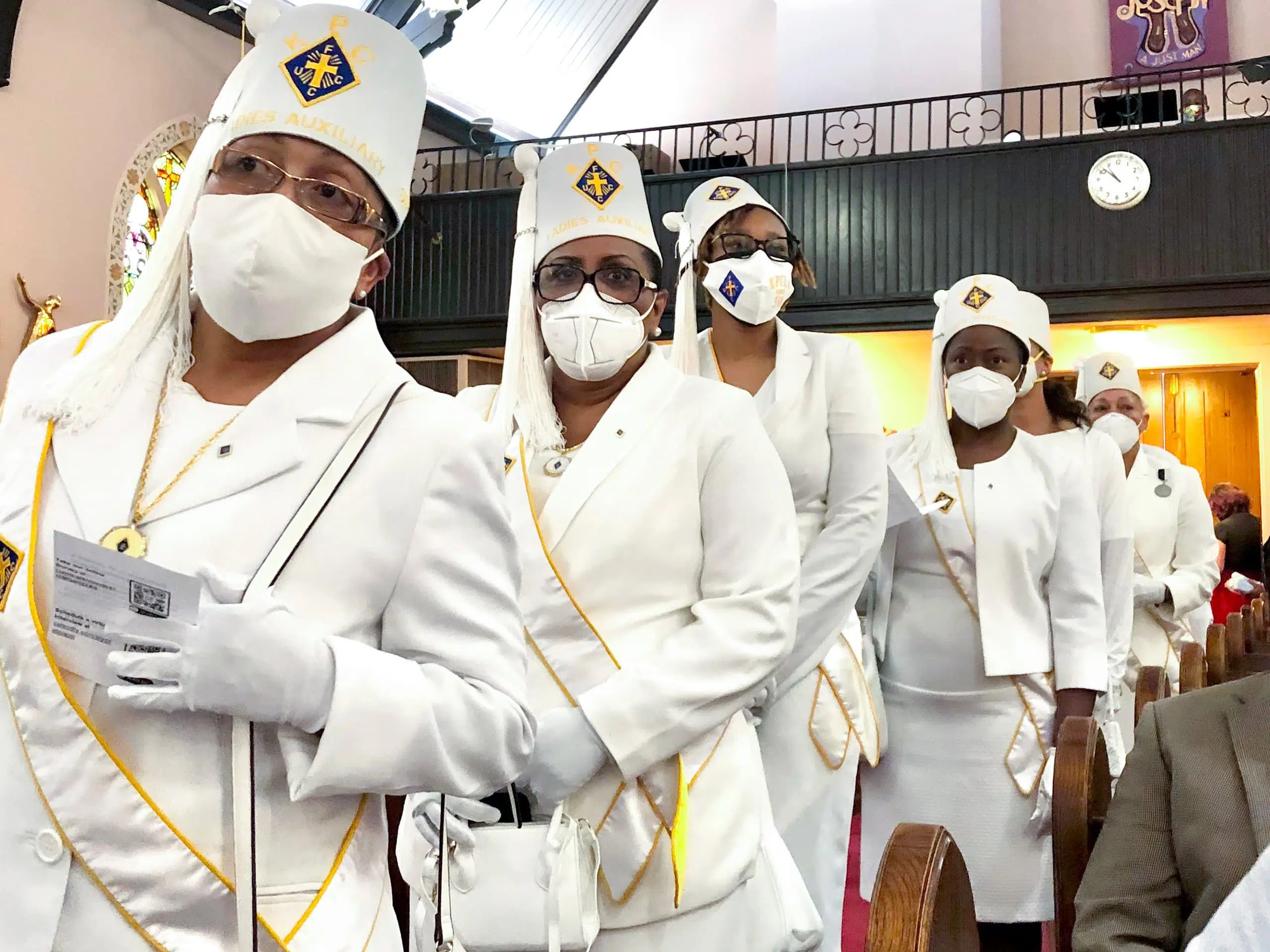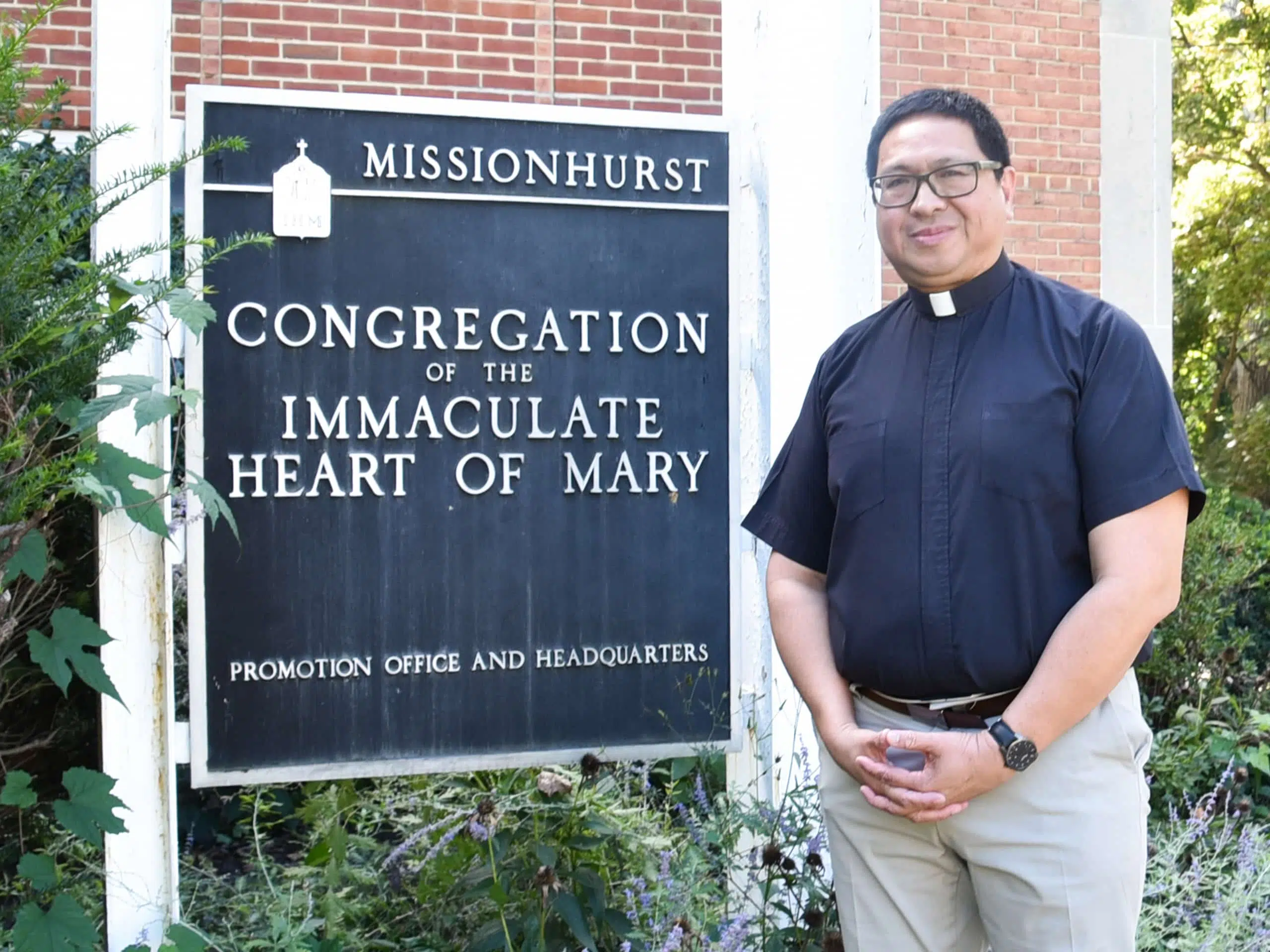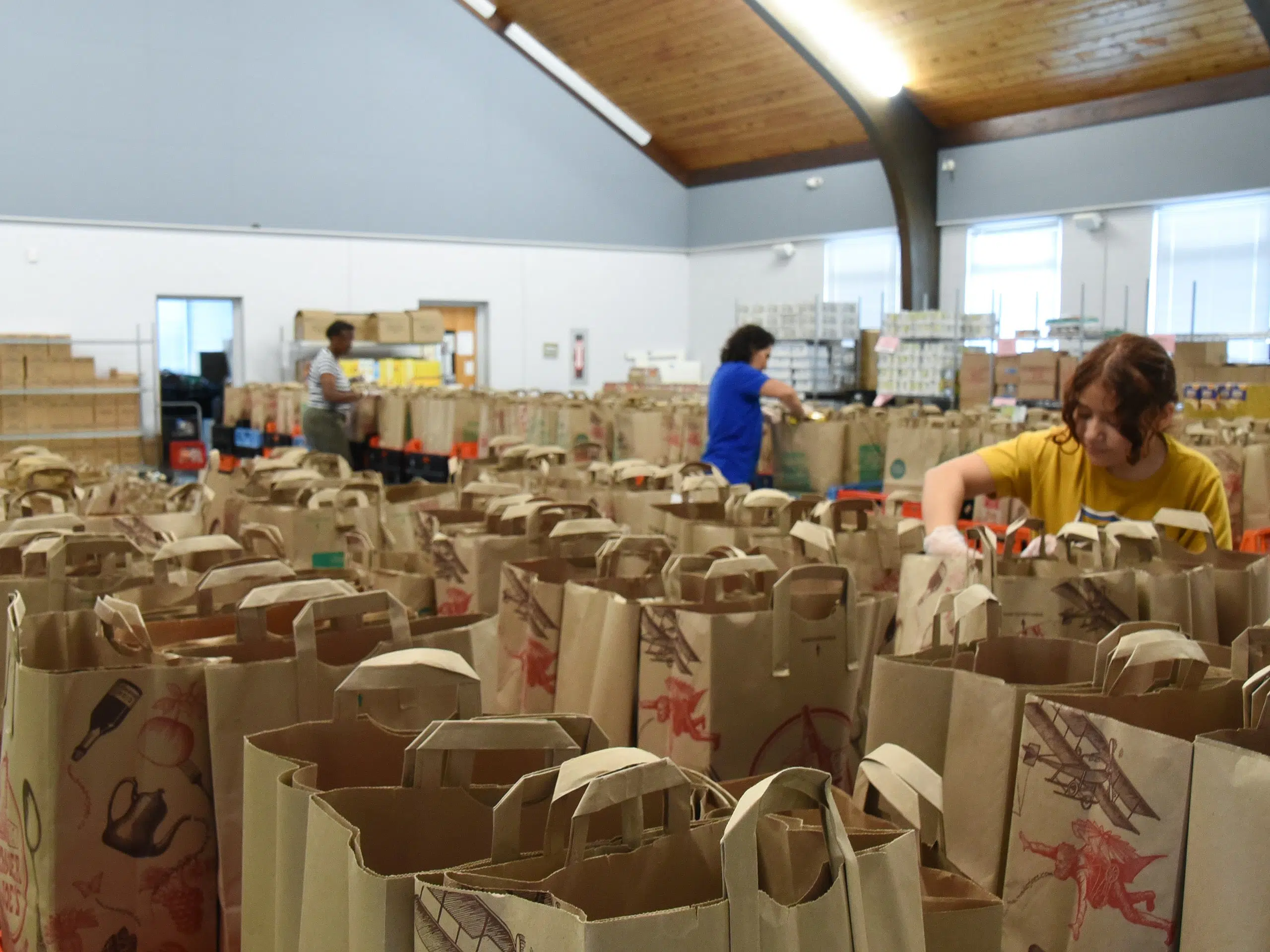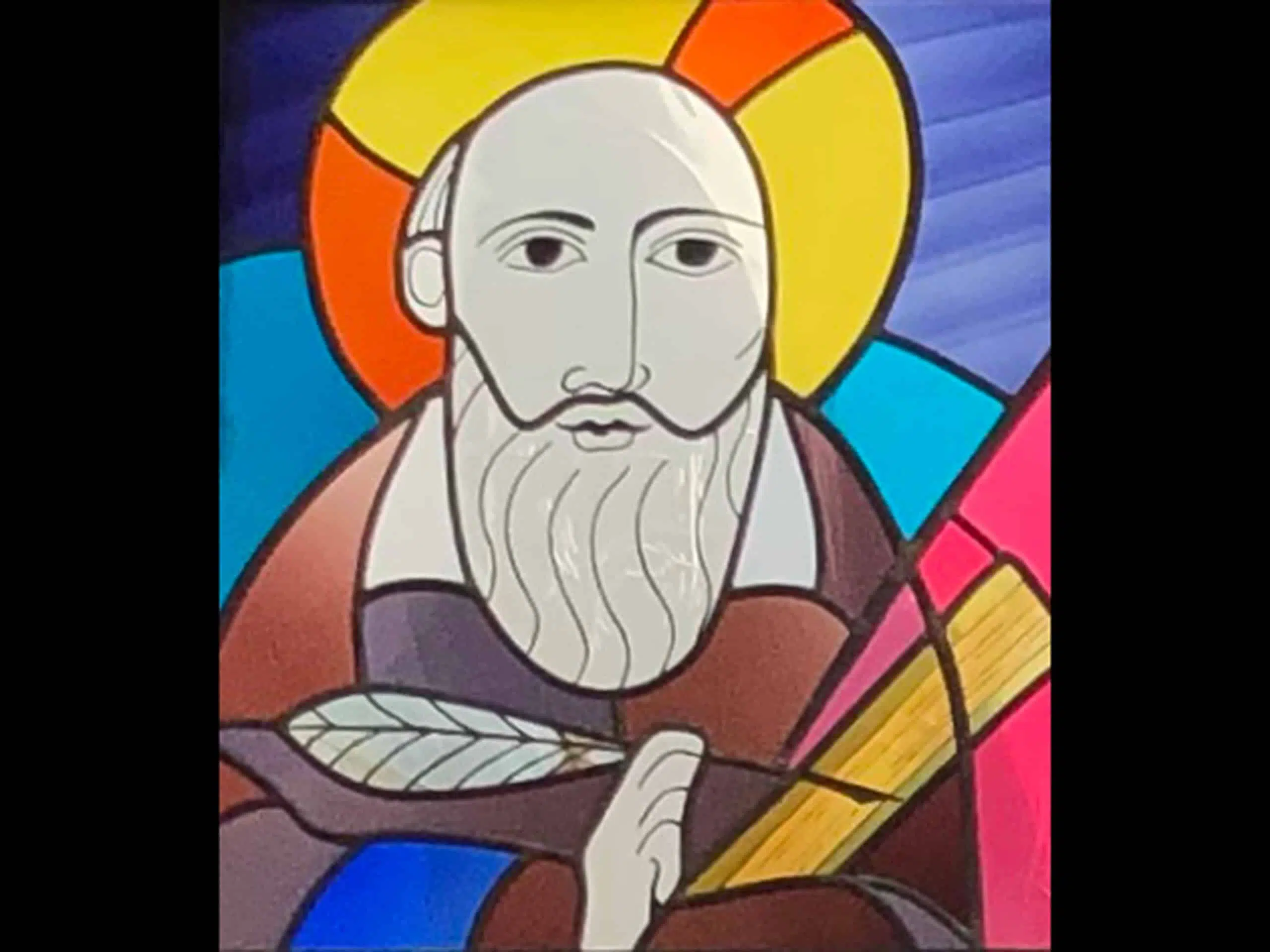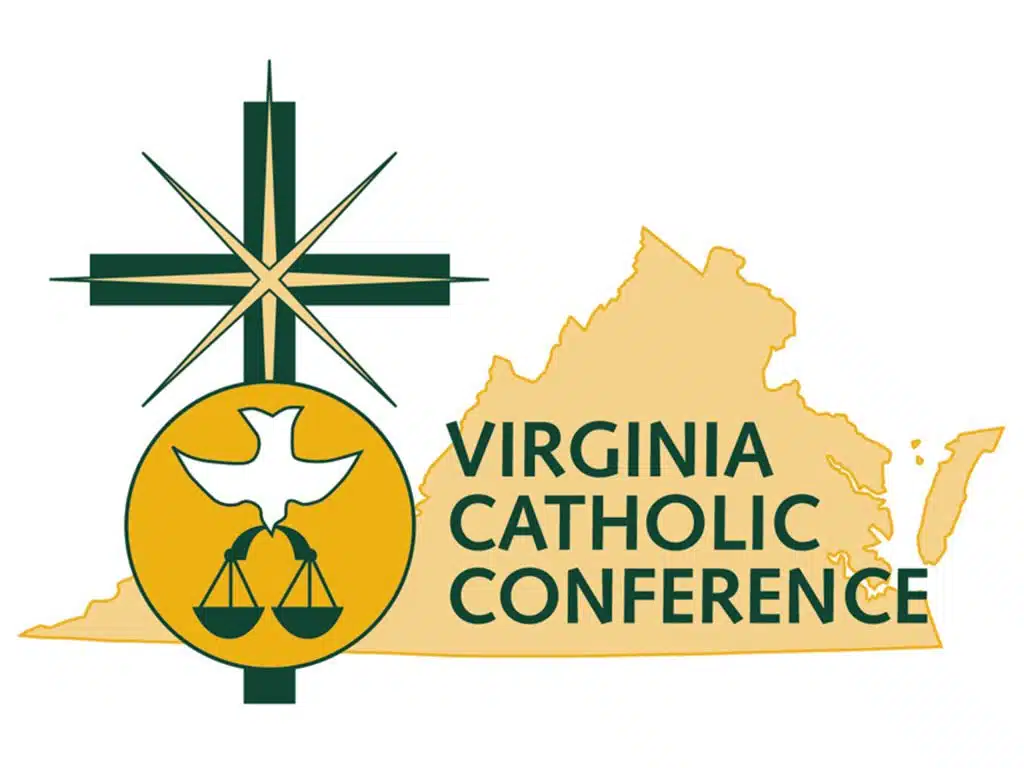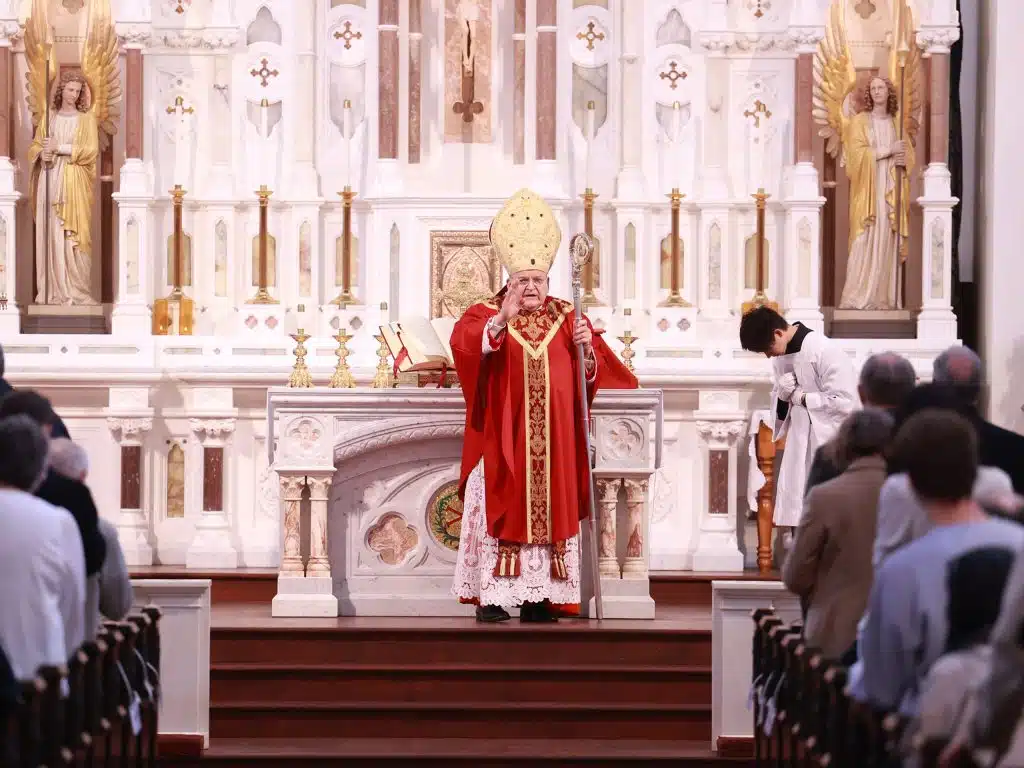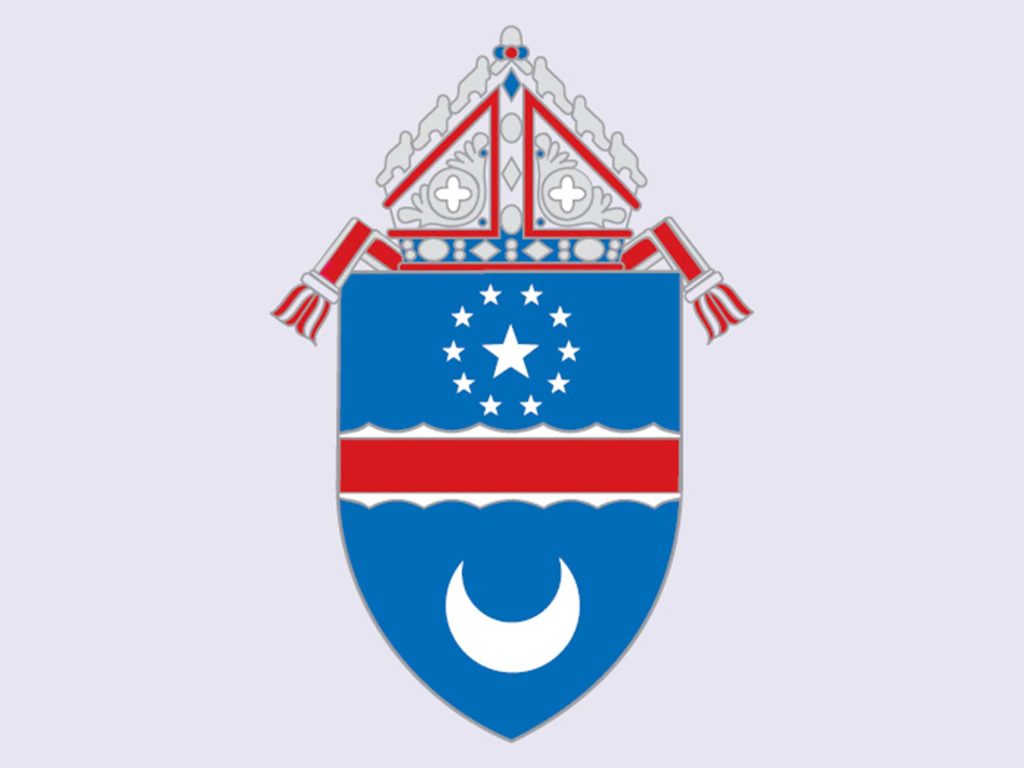While most of the 70 parishes in the Arlington diocese are served by diocesan priests, nine are staffed by members of religious orders or institutes, which serve at the invitation of the bishop. Each order brings its own spiritual gifts, or charisms, inspired by its founders.
‘A family of families,’ centered on the Eucharist
Disciples of the Hearts of Jesus and Mary
A small community of priests in the Arlington diocese has a special focus on ministering to today’s struggling families.
“We call ourselves priests for the family,” said Father Álvaro Montero of the Disciples of the Hearts of Jesus and Mary, a religious congregation founded in Spain in 1987. He became pastor of Our Lady of Angels Church in Woodbridge two years ago, early in the pandemic.
“The center of our ministry is family life and the sacraments,” he said, adding that “the real pandemic today is broken families and violence. The biggest gift God has given us is our family, and the net of relationships we have. We teach what it means to be connected and to support each other.”
Father Montero lives in community with four other Disciples. The congregation in Spain and the U.S. now has 40 members, with several more in formation, some from U.S. parishes. “We have vocations, thanks to God,” he said. Since coming to the states in 2004, the Disciples have served parishes and schools in Northern Virginia and Littleton, Colo., where Father Montero was pastor. In July, they opened a new community in Stamford, Conn.
The Disciples were at Queen of Apostles Church in Alexandria (2013-2020) when Bishop Michael F. Burbidge asked if they would consider moving to Our Lady of Angels, a much larger multicultural parish with 4,800 families, more than half Spanish-speaking. The rest are a mix of many cultures, including Filipinos, Vietnamese, Koreans and Africans.
Father Montero said the Disciples see a parish as “a family of families” centered on the Eucharist, which they support through their preaching, faith formation, confession, spiritual direction and friendships. Not everyone may have a big family, but “we all have the big family of the church,” he said, and some are called to nurture new life in other ways.
While theological study is part of the Disciples’ formation and many teach on the university level (including Father Ignacio de Ribera, who teaches philosophy at the Catholic University of America), they are very down to earth, said Melissa Chaves, a bilingual administrative assistant who attends Our Lady of Angels with her husband, a native Spanish speaker. Her daughter and son-in-law come with their kids, and her in-laws are parishioners, too.
“This order is very personable, very much about getting to know everyone and having a personal connection,” she said. “You know they’re really smart and well-read, but they can bring it down to the level of what this means to everyday families and keep the homilies right to the point and practical.”
She added that all the priests in the community “are completely bilingual, which makes a difference in how they interact with the community and bring all cultures together.”
Franciscans
Two parishes in the diocese are staffed by Franciscans who embrace the spirituality of St. Francis of Assisi, one of the church’s most beloved saints. The brown-robed Order of Friars Minor (OFM) staffs St. Francis of Assisi Church in Triangle, while Friars of the Third Order Regular (TOR), who wear black, staff St. Joseph Church in Herndon.
“In the Franciscan family, there are many branches working together,” said Father Thomas Bourque, pastor of St. Joseph. “There are slightly different forms, but we all follow Francis, in the footsteps of Jesus.”
The Franciscans were invited to St. Joseph in 1981 by Bishop John R. Keating, who had been a classmate of the Franciscan minister general. He approached the Franciscans after the departure of the Holy Ghost Fathers, who had served at the parish 31 years. “Most bishops like to have several religious orders staffing parishes, because it brings different spiritualities and complements the priesthood throughout the diocese,” Father Bourque said.
The Franciscan charism has many facets: “The Eucharist is very important to us, and care for creation is a huge thing,” Father Bourque said. Visitors will see lovingly maintained plantings around the 15.5-acre campus, and features such as drinking fountains that display how many disposable plastic bottles won’t end up as trash. Statues of St. Francis can be found next to the church and greenhouse, where seedlings get a head start for the parish garden. Most of the produce is donated to a local homeless shelter — care for the poor is another hallmark of the Franciscan charism. The parish also celebrates feast days of all the Franciscan saints, and holds evening prayer in honor of the Transitus of St. Francis every Oct. 3, the anniversary of his passage into heaven.
The Triangle parish also is known for its care for the poor and environmental stewardship. The St. Francis House food pantry and outreach ministry opened in 1992, and in 2014, it was the first church in Virginia to complete the GreenFaith certification program. Parish gardens feature native plants and parishioners can enjoy picnic areas and outdoor prayer spaces. The campus is a certified National Wildlife Federation wildlife habitat, with bird feeders all over the grounds. The Care for Creation ministry offers links to Franciscan resources and the pope’s Laudato Si’ environmental action plan, named for St. Francis’ Canticle of the Sun.
Missionhurst Fathers, CICM
An international order of missionaries, the Congregation of the Immaculate Heart of Mary, has made its U.S. headquarters on an 11-acre property called Missionhurst in Arlington for 75 years. Known in the U.S. as the Missionhurst Fathers CICM (the abbreviation of their name in Latin), the congregation currently staffs St. Ann Church in Arlington and the Mt. Tabor community in Vienna. In past years, they also served at Precious Blood Church, Culpeper; St. John the Beloved, McLean; Holy Spirit, Annandale; and Our Lady of the Blue Ridge in Madison, among others.
The order was founded in Belgium in 1862 by Father Theophile Verbist for the evangelization of China, but the Chinese Communist Revolution of 1949 resulted in missionaries being expelled and the order redirected its efforts to other countries, including the U.S.
Missionhurst priests in the U.S. increasingly focus on multicultural ministry, especially to Hispanic communities. “One of our CICM charisms is to be able to serve the needs of our local church. If a bishop calls and says, ‘I really need you to do this type of work,’ we serve,” said Father Celso Tabalanza, superior of the U.S. province. Both he and St. Ann’s pastor, Father Mel O. Portula, grew up in the Philippines.
“We are multicultural, so we are able to reach out to other multicultural communities,” Father Tabalanza said. “Ourselves being a stranger, an immigrant in this country, it’s a lot easier for us to empathize with other cultural groups just coming into the country or who feel lost.”
Spiritans
The Congregation of the Holy Spirit, once known as the Holy Ghost Fathers and now as the Spiritans, has staffed Our Lady, Queen of Peace Church in Arlington since the order helped 14 Black families found the parish in 1945, said Father Timothy Hickey, pastor.
“Part of the Spiritan charism is to reach out to and work with the poor and immigrants and the marginalized,” he said. “This activity very much included African Americans.”
It’s all part of the Spiritan directive “to be open to the movement of the Holy Spirit, and listen to where you are led by the Spirit,” he said. The Spiritans cite the influence of two founders, one in the early 1700s, Claude Poullart des Places (now a Servant of God), who cared for the poor and homeless on the streets of Paris, and a second in the 1800s, a Jewish convert named Francis Libermann, who revitalized the order with a similar vision of working with freed slaves in Haiti.
“Libermann used to say we were called to be like a feather before the breath of God,” said Father Hickey. “That docility and openness to the Holy Spirit breeds a certain stance toward the world and stance toward others. It doesn’t mean you pick up every idea that comes along, obviously, but discernment is a big part of the Spiritan charism and tradition.”
The parish is active in social justice work and social outreach. It supports an impoverished parish in Medor, Haiti, runs a free used clothing ministry called Matthew 25 and operates a food pantry that provides groceries to more than 500 families a week.
The parish also has discerned a call to environmental stewardship, said Father Hickey, who banned single-use plastic water bottles and distributes reusable water bottles at parish events. “As missionaries, we are very concerned with care for creation,” he said. “Climate change impacts the poor the most.”
Josephite Society of the Sacred Heart
Since its founding in 1871, the Josephite Society of the Sacred Heart, known as the Josephites, has ministered exclusively to African Americans. It remains the only men’s religious community with this mission, said Father Donald Fest, pastor of St. Joseph Church in Alexandria, founded in 1915.
“We’re here at St. Joseph’s because of the Black presence,” said Father Fest, one of 55 Josephite priests who staff 40 parishes in eight states and Washington, D.C. He noted that 80 percent of the nation’s 3 million Black Catholics belong to predominantly White parishes where their culture is largely invisible. Josephite parishes celebrate “the flavors of African American culture” through music and other traditions, he said. “The Masses tend to go longer than other parishes, the music might be a tad different, and enthusiasm and expressions might be more pronounced.”
Josephite parishes also offer the opportunity for more African American parishioners to have leadership positions in the parish. “That’s one of the reasons these parishes were founded and exist to this day,” he said. Many parishioners are active in the Knights of Peter Claver and Ladies Auxiliary, a Black Catholic fraternal service organization founded by the Josephites. “It means something to people when you see your customs, traditions or culture being celebrated,” Father Fest said.
While St. Joseph is considered a “historically Black parish,” it welcomes all people, he added. “The White people who come here like the atmosphere; nobody is in a rush. They know Mass is going to be more than an hour and that doesn’t faze them. They come because they want to.”
Vietnamese Dominicans
Vietnamese immigrants and their families can worship in their own language at Holy Martyrs of Vietnam Church in Arlington, staffed by the Vietnamese Dominicans of the Regional Vicariate of St. Vincent Liêm (OP), based in Calgary, Alberta, Canada.
The first Vietnamese parish established in the U.S., Holy Martyrs was founded after the fall of Saigon in 1975. By 1977, the diocese under Bishop Thomas J. Welsh had welcomed 2,300 refugees, more than any other except Los Angeles. The Vietnamese Dominicans help parishioners preserve their cultural traditions by celebrating festivals such as the Vietnamese Lunar New Year and other events. A Vietnamese Eucharistic Youth Movement reaches out to children and teens.
The order also ministers to the mission of Our Lady of La Vang, based in Chantilly. When it was established in 2017, Bishop Michael F. Burbidge said he was grateful for the order’s work, which “is critical to our outreach to Vietnamese Catholics.”
Oblates of St. Francis de Sales
Priests of the Oblates of St. Francis de Sales staff two parishes in the diocese: Our Lady of Good Counsel Church in Vienna and St. John Neumann Church in Reston.
Oblate Father Matt Hillyard, pastor of Our Lady of Good Counsel, said Oblates are “formed from Day 1” in the spirituality of St. Francis de Sales, the French saint and doctor of the church known for his writings on the “little virtues” of patience, gentleness and humility as a path to holiness accessible to everyone.
“He was huge on talking about the holiness of lay people; it was one of his major emphases and it’s one of ours, too,” said Father Hillyard. Oblates “try to embody that in the way we try to be with people and the focus of our outreach.” Most Oblate-staffed parishes “take a real team approach,” with collaboration between the clergy and lay leadership of the parish, he added.
Living in community with brother priests also is important, and is what drew him to a religious order, said Father Hillyard, who lives with three other Oblates at Our Lady of Good Counsel. “Prayer, fellowship and community-building are a really big part of our lives; we take at least our dinner meals together and pray together. People can see that we love each other, but also have a tendency to poke fun at each other — not in a mean way, but a way that’s very human and down to earth.”
Oblates often point to Salesian spirituality in their homilies, he said, and Salesian sayings decorate the walls of Oblate parishes and schools, including at St. John Neumann, where one quotation has been turned into a colorful wall mural. “Every kid in a Salesian school knows oft-quoted mottos such as ‘Be who you are and be that perfectly well,’ ” he said. “Francis had a lot of little phrases he thought were important for people to hold onto.”
